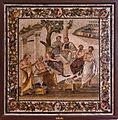Rival Lovers facts for kids
Rival Lovers is an ancient Greek text, like a written conversation, that many people believe was written by the famous philosopher Plato. In this text, the main character is Socrates, another well-known philosopher, who asks a lot of questions to explore different ideas.
What is Rival Lovers?
Rival Lovers is a short piece of writing that explores ideas about education and what makes a good person. It's set up as a discussion, which is why it's called a dialogue. In this dialogue, Socrates talks with two young men who are arguing about whether it's better to love wisdom (philosophy) or physical training and sports. Socrates helps them think through their ideas by asking clever questions.
Who Was Plato?
Plato was a very important philosopher who lived in Ancient Greece from about 428 to 348 BC. He was a student of Socrates and later became a teacher himself. Plato founded a famous school in Athens called the Academy, which is often considered the first university in the Western world. He wrote many dialogues, where he used characters like Socrates to discuss big ideas about justice, beauty, equality, and government. His writings have influenced thinkers for thousands of years.
Who Was Socrates?
Socrates was an ancient Greek philosopher who lived from about 470 to 399 BC. He is famous for his way of teaching, known as the "Socratic method." Instead of just telling people answers, Socrates would ask a series of questions to help others think critically and discover truths for themselves. He believed it was important to question everything and understand what you truly know. Socrates didn't write any books himself; everything we know about him comes from his students, especially Plato.
What is a Dialogue?
In ancient Greece, a dialogue was a popular way to write about philosophy. It's basically a written conversation between two or more characters. Philosophers like Plato used dialogues to present different viewpoints and explore complex ideas. By showing characters discussing and sometimes disagreeing, dialogues allowed readers to see how arguments were built and how different ideas could be challenged or supported. It's like reading a script of a play where the characters are debating important topics.
Images for kids


